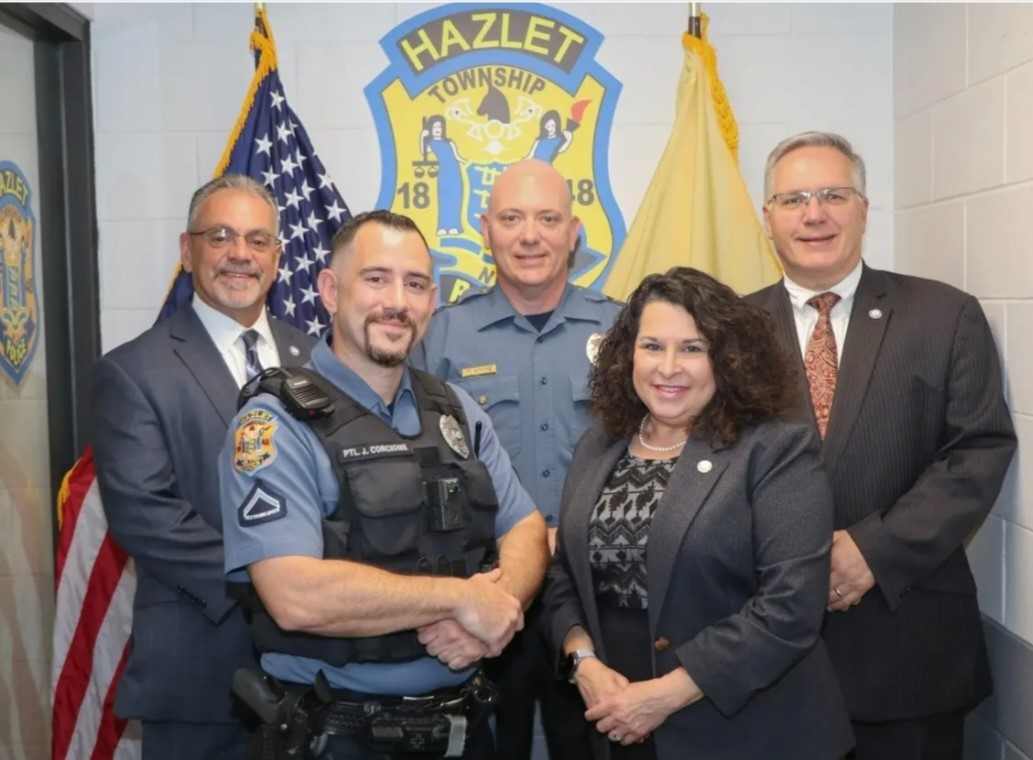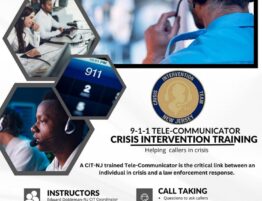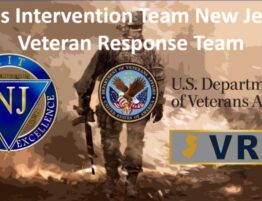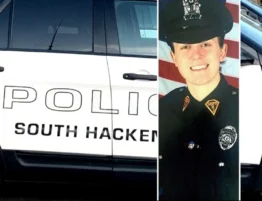
FREEHOLD, NJ— Hazlet Patrolman John Corcione was praised Friday by the Monmouth County prosecutor for his compassionate handling of a call for a person in distress, ensuring that day that “everyone goes home,” as he put it.
The officer, who attended a recent prosecutor’s office Crisis Intervention Training, used the lessons that he learned only weeks earlier to help the person who was attempting self harm, said Acting Monmouth County Prosecutor Lori Linskey in a news release.
Hazlet police received a call in the morning on June 29 from a homeless transgender subject, who was living out of a van in the parking lot of a local storage facility. The subject requested EMS, because he reported that he was suicidal and very distraught. The subject had stated that they were sitting in the van attempting to die by CO poisoning from a propane cooking stove. Additionally, dispatch had relayed that the subject had multiple knives and would attack police if contacted by them
The individual was adamant to dispatchers that police should not respond to the area, telling dispatch that they did not want the police to respond and that the only good cop is a dead cop. It was evident that the person had ill feeling towards police, maybe from past dealings.
But Patrolman John Corcione, a Field Training Officer, responded with a brand new officer who was riding with him in his vehicle that day, for the Hazlet Police Department. Officer Corcione, stated he need to help this subject in crisis, and had just completed a crisis training (CIT-NJ) in May.
When he got to the scene, Corcione began to talk with the person who was sitting in a car at the time, holding a weapon. Corcione used skills in de-escalating the situation that he learned in the training class, the news release said.
“You’ve got to let me help you,” were some of the first words he spoke to the individual.
The officer even told the person about the training and explained that he was trained to respond to critical incidents to get people to “even better hands” to help.
Corcione successfully convinced the person to drop the weapon, and assisted the person in calming down even allowing Officer Corcione, to conduct a pat down for safety, allowing emergency EMS staff to arrive, and render treatment.
“Officer Corcione did exactly what he was trained to do and his actions in this crisis situation are an incredible, real world example, of CIT-NJ (crisis intervention training) making a difference in the field. ‘I would like to recognize and thank Officer Corcione, Hazlet Police Chief Ted Wittke for his strong support of the training, and the other officers and EMS personnel who assisted in this incident,” Linsky said.
“The compassion and heart that this officer provided to this individual in need saved a life, and we are hopeful that the person in crisis is getting the compassionate care that they need,” she added.
Hazlet Police Chief Ted Wittke also praised his officer.
“It’s evident by the actions of Officer Corcione that (crisis intervention) training works by giving officers the skills to effectively defuse these high-stress incidents. He did a great job and we are all very proud of him.”
Corcione recalled the incident.
“Thankfully, this individual and I crossed paths at exactly the right time. Maybe we ended up exactly where we were supposed to be that day, so the individual could get the help that was desperately needed. We just did our job, which is to make sure everyone goes home.”
The prosecutor’s office has its next crisis intervention training class in October. Each class trains approximately 25 police officers and five mental health professionals and includes an in-depth look at mental illness, behavioral health, developmental disabilities and their implications for a law-enforcement response during a crisis, with a strong emphasis on de-escalation.
Instructors for the training include behavioral and mental health professionals from Monmouth Medical Center in Long Branch, the Monmouth County Mental Health Association, the Monmouth County Mental Health Board and CPC Behavioral Healthcare, as well as crisis resolution experts.
Law-enforcement officers learn to apply the strategies they learn in real-life situations in order to minimize the potential for injury or violence.
Mental and behavioral health practitioners also sit in as students in the class in order to build relationships with the police officers, and to better understand the issues they face while often serving as the initial responders to such calls for service, the news release said.








